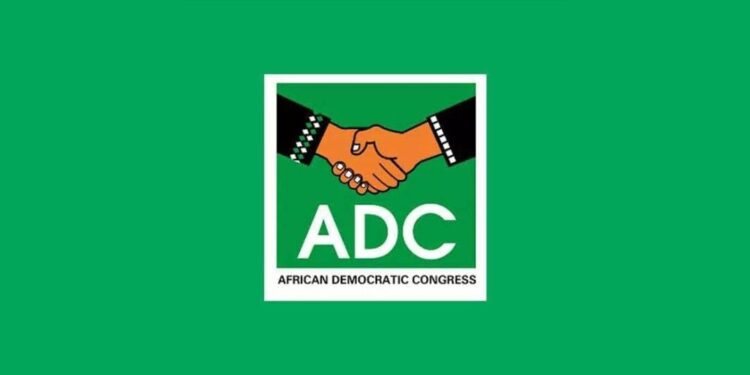The African Democratic Congress (ADC) has leveled serious accusations against the Presidency, claiming that the Tinubu administration is orchestrating a deliberate campaign to destabilize the emerging opposition coalition formed to challenge President Bola Tinubu’s re-election bid in 2027.
The allegations come as the newly formed opposition platform faces internal challenges, including a legal suit filed at the Federal High Court in Abuja by three disgruntled members seeking to remove the Senator David Mark-led interim leadership of the party.
In a statement released yesterday, ADC Interim National Publicity Secretary and National Coalition Spokesperson, Mallam Bolaji Abdullahi, accused the Presidency of initiating covert operations designed to weaken the coalition through intimidation and coercion tactics.
“We have credible intelligence that the aim of this meeting is not for national security or peace-building. It is to intimidate, coerce, and if possible, co-opt these individuals into a fabricated scheme against the opposition coalition. This is not politics. This is sabotage,” Abdullahi declared.
According to the ADC spokesperson, former state chairmen and senior party executives from the North-East and North-West regions were allegedly invited to secret meetings with high-ranking federal officials as part of this destabilization strategy.
The opposition coalition, which was officially launched on July 1 with the ADC unveiling following on July 2, has attracted several high-profile defections from both the ruling APC and the main opposition PDP. Notable figures who have joined the coalition include former Vice President Atiku Abubakar, former Senate President David Mark, Labour Party’s 2023 presidential candidate Peter Obi, former Transport Minister Rotimi Amaechi, former Osun State Governor Rauf Aregbesola, and former Kaduna State Governor Nasir el-Rufai.
The coalition has also gained momentum through strategic defections, including former Secretary to the Government of the Federation, Babachir Lawal, who announced his departure from the APC. Additionally, former PDP chairman in Katsina State, Salisu Lawal Uli, and PDP Board of Trustees member Adamu Waziri have both left their respective parties to join the ADC-led coalition.
To accommodate these new entrants, the ADC dissolved its existing party structure under the leadership of founding National Chairman Ralph Nwosu, paving the way for the broader coalition arrangement.
Abdullahi characterized the alleged presidential interference as “a direct assault on Nigeria’s multi-party democracy,” warning that such actions could steer the country toward a one-party state. He suggested that the coalition’s formation has significantly concerned the ruling party, prompting desperate measures to maintain political dominance.
“The July 1 coalition declaration and the July 2 unveiling of the ADC have rattled the ruling party. It is now obvious that the Tinubu administration, having lost the trust of the Nigerian people, cannot withstand the pressure of a united and credible opposition,” he stated.
The ADC spokesperson directly appealed to President Tinubu to restrain his appointees and demonstrate his commitment to democratic principles. He drew parallels to the 2015 election, suggesting that the current administration’s alleged intolerance mirrors what could have prevented the APC’s own rise to power.
“He needs to remind his men that if the Goodluck Jonathan administration was as intolerant and as subversive of the opposition, the APC would not have come to power in 2015 and he would not have been a president today,” Abdullahi argued.
Despite these external pressures, the ADC spokesperson expressed confidence in the coalition’s resilience and purpose. “Let it be clear: the coalition movement is an idea whose time has come. This party belongs to every Nigerian who is tired of the lies, the manipulation, and hardship,” he declared.
However, the coalition faces internal challenges beyond alleged external interference. Former ADC national chairman Ralph Nwosu has warned that the newly formed opposition alliance could collapse under the pressure of conflicting interests and rival political factions if not carefully managed.
Regarding the 2027 presidential ticket, Abdullahi clarified that the coalition is not currently engaged in discussions about candidate selection. “We’re not having any of those conversations right now. That will come later. For now, we’re focused on building the party to offer Nigerians a viable alternative,” he explained.
The ADC’s accusations add another layer of complexity to Nigeria’s evolving political landscape as the country approaches the 2027 general elections, with both ruling and opposition parties positioning themselves for what promises to be a highly competitive electoral contest.



















